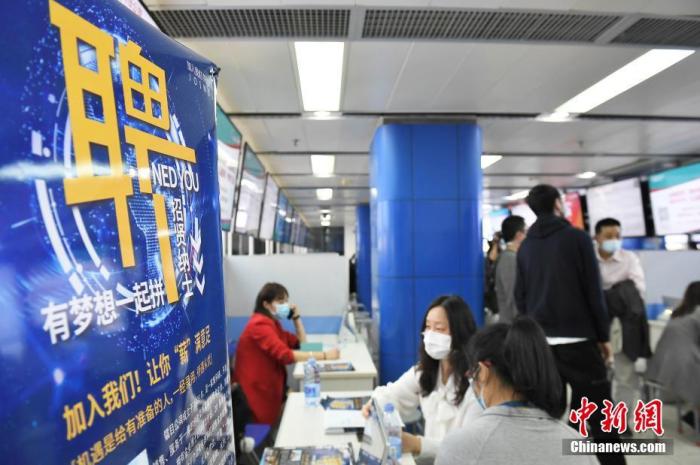(Observation of the Two Sessions) How can China accomplish the "more arduous" task of stabilizing employment?
China News Service, Beijing, March 8 (Reporter Wang Enbo) After successfully completing the expected goals last year, China is still facing a complicated situation to stabilize employment this year.
"The recovery of consumption and investment is slow, it is more difficult to stabilize exports, the supply of energy and raw materials is still tight, the production and operation of small, medium and micro enterprises and individual industrial and commercial households are difficult, and the task of stabilizing employment is even more arduous." The government work report made such a judgment.
Xiang Dong, deputy director of the Research Office of the State Council of China, explained that this year, China needs nearly 16 million new growth labor force to be employed in cities and towns. In particular, the number of college graduates has increased to 10.76 million, a record high, and the small and medium-sized enterprises carrying hundreds of millions of jobs and entrepreneurship. Micro-enterprises and individual industrial and commercial households still face many difficulties.
Data map: Job seekers apply for jobs.
Photo by China News Agency reporter Chen Chuhong
To deal with more arduous tasks, the government work report puts forward higher requirements.
While the target of new urban employment continued to be maintained at "more than 11 million", the urban surveyed unemployment rate target was further clarified to "within 5.5%" from the previous year's "about 5.5%".
The official also stated that the annual economic growth target also incorporates the consideration of stabilizing employment, protecting people's livelihood and preventing risks.
This means that the employment priority orientation is further highlighted.
The implementation of higher requirements requires stronger measures.
"The key to strengthening employment priority is 'stabilizing market players'." Zheng Yali, deputy to the National People's Congress and president of Zhejiang Finance Vocational College, said bluntly that the current economy is recovering steadily, but the production and operation of some industries and enterprises have not yet fully recovered.
In response to this phenomenon, the government work report requires that fiscal, taxation, financial and other policies should be prioritized around employment.
It is expected that the annual tax rebate will be about 2.5 trillion yuan, and the scale will reach a record high.
The government also plans to encourage financial institutions to reduce actual loan interest rates and fees, so that the majority of market players can feel the convenience of financing has improved and comprehensive financing costs have actually dropped.
According to Lei Jun, deputy to the National People's Congress and chairman and CEO of Xiaomi Group, such an unprecedented policy strength and efficiency will effectively boost market confidence and significantly improve the survival and development environment for market players.
Wang Yiming, member of the National Committee of the Chinese People's Political Consultative Conference and former deputy director of the Development Research Center of the State Council, said that stabilizing SMEs will stabilize employment fundamentals. The report proposes a series of measures to increase support for SMEs, which will help better achieve this year's goal of stabilizing employment .
To stabilize employment, in addition to "hard measures" such as burden relief and relief, some "soft measures" starting from security are also needed.
Wu Duanhua, deputy to the National People's Congress and senior technician of the Zhuzhou branch of BAIC Motor Co., Ltd., noted that the development of China's advanced manufacturing industry requires a large number of skilled workers and new blue-collar workers to join it, but blue-collar groups generally have low education and low skills, especially migrant workers. The lack of systematic training and learning does not match the job skills required for manufacturing upgrades.
This has led to the coexistence of "difficulty in employment" and "difficulty in recruiting" for blue-collar groups in recent years.
Data map: Workers work in a factory.
Photo by China News Agency reporter Wang Dongming
Wu Duanhua suggested that to promote the employment of blue-collar groups and ensure the transformation and upgrading of the manufacturing industry, it is necessary to start with multiple links such as rights protection, institutional mechanisms, training, and employment efficiency, so that more young people can embrace the real economy.
Flexible employment is an important employment channel in China at present. While creating employment opportunities for the people, especially those in need, it also puts forward higher requirements for employment services and social security.
Especially during a pandemic.
Zhu Jiandi, deputy to the National People's Congress and chairman of Lixin Certified Public Accountants, said that it is necessary to study and promote the legislation of new employment forms as soon as possible, improve the flexible employment guarantee policy, and realize the basic rights and interests of flexible employees in remuneration, household registration, housing, children's education, occupational injury protection, etc. They enjoy the same treatment as those in stable employment, thereby enhancing the sense of security and belonging of those in flexible employment.
Xiang Dong said that this year, China will improve support measures, improve flexible employment labor and social security policies, promote the healthy development of flexible employment, and encourage enterprises to create more jobs with stable income, complete security and various forms in the recovery and development.
(over)

